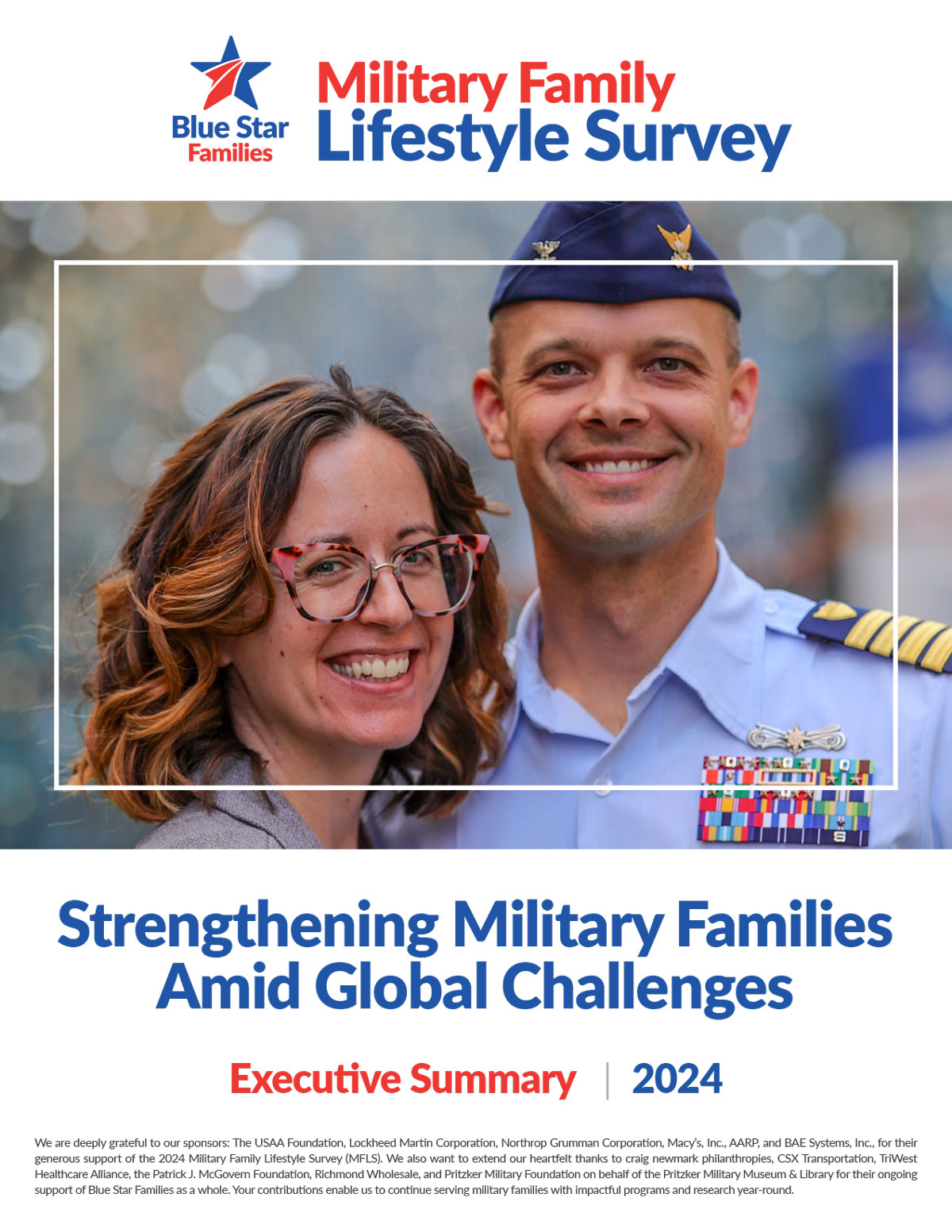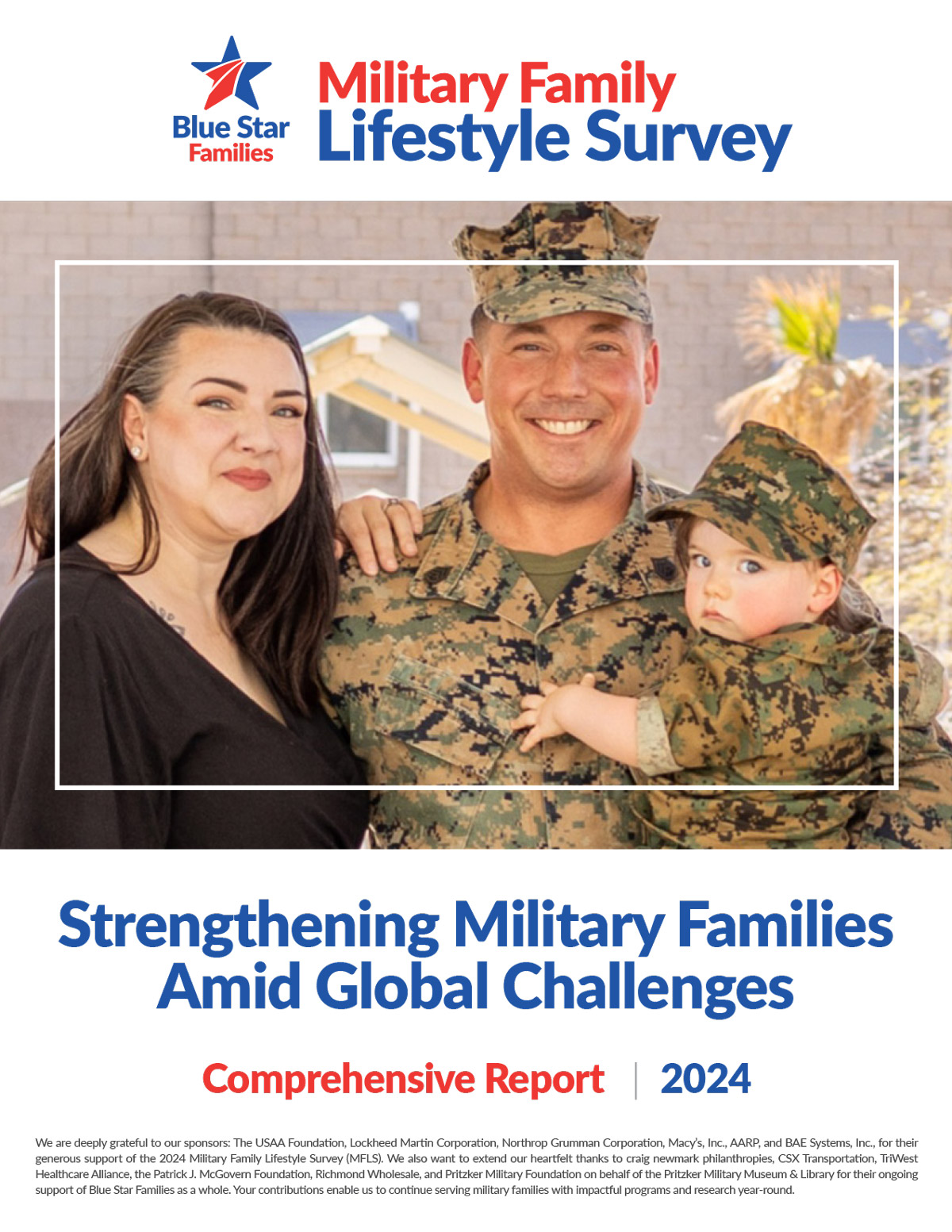

2024 Military Family Lifestyle Survey Results Release

Overview
Blue Star Families’ annual Military Family Lifestyle Survey (MFLS) has been the preeminent way to understand the experiences and challenges faced by military families since its inception in 2009. Gathering more than 107,000 cumulative responses, the MFLS provides valuable insights into a wide range of issues affecting military families, including access to health care, food insecurity, employment, and housing.
Blue Star Families conducted the 2024 Military Family Lifestyle Survey from March to May 2024. Capturing the experiences of nearly 5,600 respondents worldwide and generating millions of data points, the MFLS remains the largest and most comprehensive survey of active-duty, National Guard, and Reserve service members, Veterans, and their families.
Overview of Military Family's Top Issues
- The top issues for active-duty spouses and service members reveal overlapping concerns related to financial stability, family well-being, and quality-of-life challenges.
- The top concern for active-duty spouses continues to be military spouse employment with military pay, time away from family due to service, housing affordability, and children’s education rounding out the top five concerns.
- Similarly, service members prioritize military pay, housing concerns, and time away from family, while also highlighting spouse employment, lack of control over their military career, and access to health care systems.
- The amount of time separated from family remains the central concern for National Guard and Reserve family respondents, as it has been since 2020, followed by military pay, the impact of deployments on family, and access to health care.
- Access to military and VA health care systems was by far the top issue of concern for both Veteran respondents and spouses of Veterans, reflecting its critical importance to their well-being.
- Both Veteran and spouses of Veteran respondents express concerns about the transition from military to civilian life, highlighting ongoing challenges faced by Veteran families as they navigate post-service life.
What Does the DAta Say
U.S. Military, and Military Families, are Key to Peace and Stability Amid Global Uncertainty
Military families are proud to serve and recognize the value of military service, citing exceptional benefits such as financial stability, health care, and diverse experiences that are unmatched in civilian life. These families play a critical role in global stability, and stand at the ready to serve in the face of growing global unrest. Both Americans (67%) and military families (83%) believe that the U.S. will face a major conflict within the next 3–5 years. 1
45% of Americans believe the public truly appreciates military families’ sacrifices, 2 but only 19% of military families agree. In addition to public perception and civilian support, military families also face continued lifestyle challenges, including financial strain driven by rising costs of living that outpace salary growth, similar to trends affecting many Americans. Persistent quality-of-life concerns — such as barriers to spouse employment and child care, declining housing affordability, and reduced access to vital benefits like health care — have eroded satisfaction with military life and decreased the likelihood of recommending military service.
2024 Survey Findings Summary
Though 7 in 10 respondents say military service has added value to their family’s life, only one-third would recommend military service to a young family member. While many Americans believe the public truly appreciates military families’ sacrifices, few military families agree.
Military families are essential to global stability and are proud to serve this role. Eight-three percent of active-duty families and 67% of Americans anticipate U.S. involvement in a major conflict within the next three to five years, and 3 in 5 believe that military families are very important in creating a peaceful, stable world.
Spouse Employment & Child Care:
![]()
Child care continues to be a top barrier to employment for active-duty spouse respondents; spouses take two or more months to find care following a relocation. Many are not aware of fee assistance programs or face barriers to using them.
Child care remains a significant barrier to employment for active-duty spouses, with many taking over two months to secure care after relocating and facing high costs, limited availability, or a lack of awareness about fee assistance programs.
Active-duty family respondents’ financial situations are challenged by military pay concerns, relocation, and spouse unemployment. For most active-duty family respondents, relocation expenses take 12 or more months to bounce back from financially.
Military families face mounting financial challenges driven by military pay concerns, high relocation costs, and spouse unemployment, with many taking over a year to recover financially after a move.
Health care access remains a key issue for military families; the proportion of active-duty families who report “health care access” as a top concern has more than doubled from 2020 to 2024.
Health care benefits play a key role in retention. Among active-duty service members who have stayed in military service longer than they originally planned, 49% reported it was because of health care benefits. However, access to care is a growing concern for military families, rising from 11% in 2020 to 22% today.
Female service members are significantly more likely to recommend military service than their male peers; 1 in 2 agree that being part of the military community is an important part of their self-image, notably higher than their male counterparts.
Female service members are proud of their service and are significantly more likely to recommend service. Four in 5 female service members (79%) express pride in their accomplishments during their military service, compared to 69% of males. However, women face unique challenges, including greater concerns about child care, housing, and family building.
Suicide Prevention and Postvention:![]()
One in 4 active-duty service member respondents report exposure to a suicide within their unit/command within the 12 months preceding survey fielding. While adequate support resources are often offered after a death by suicide, there is opportunity to improve dissemination of postvention resources.
Suicidal thoughts and mental health challenges are significant concerns for military families, with 7% of service members reporting suicidal thoughts in the past year. One in 4 active-duty service members and spouses report their unit or command experienced a suicide within the past year, particularly in the Army and Navy and among Navy families on sea duty.
Post-service relocation choices and perceptions of transition preparedness are linked to Veteran respondent satisfaction with and belonging to the communities where they reside, as well as overall well-being. Veteran respondents who are satisfied with their current communities and those who have a greater sense of belonging report higher thriving mean scores than those who are unsatisfied or do not feel a sense of belonging.
Post-service relocation choices and perceptions of transition preparedness significantly influence Veterans' satisfaction with and sense of belonging to their communities, as well as their well-being.
These findings align with the recommendations of the House Armed Services Committee Quality of Life Panel Report,3 which calls for targeted action to improve military pay, child care, housing, medical care access, and spouse support.
To secure global stability in the coming years, systemic action from all sectors to address these ongoing challenges is needed to enhance the well-being, retention, and recruitment of the All-Volunteer Force.
MEDIA & PARTNERSHIP INQUIRIES
If you are a member of the media or a nonprofit organization that supports military- and Veteran-connected communities and you are interested in partnering with Blue Star Families to promote this research, contact [email protected].
FUNDERS
We are deeply grateful to our sponsors: The USAA Foundation, Lockheed Martin Corporation, Northrop Grumman Corporation, Macy’s, Inc., AARP, and BAE Systems, Inc., for their generous support of the 2024 Military Family Lifestyle Survey (MFLS). We also want to extend our heartfelt thanks to craig newmark philanthropies, CSX Transportation, TriWest Healthcare Alliance, the Patrick J. McGovern Foundation, Richmond Wholesale, and Pritzker Military Foundation on behalf of the Pritzker Military Museum & Library for their ongoing support of Blue Star Families as a whole. Your contributions enable us to continue serving military families with impactful programs and research year-round.
Funding for this essential research is provided through the generosity of our sponsors. If you are interested in funding further research, use the button below.
Quick Links
Executive Summary (PDF)
Comprehensive Report (PDF)
Pride in Service (PDF)
Spouse Employment and Child Care (PDF)
Financial Situation (PDF)
Health Care Access (PDF)
Female Service Members (PDF)
Suicide Prevention and Postvention (PDF)
Veteran Transition (PDF)
Recommendations (PDF)
Respondents & Methodology (PDF)
Authors
From the Department of Applied Research at Blue Star Families, with the exception of the Veteran finding, which was written by the team at the D'Aniello Institute for Veterans and Military Families at Syracuse University (IVMF).
Blue Star Families
- Jessica D. Strong, Ph.D., Senior Director of Applied Research
- Karly M. Howell, M.A., Director of External Affairs
- Rachel Linsner, Ph.D., Associate Director of Research
- Brooke Blaalid, MSW, Associate Director of Policy
- Kristen A. Higgason, MLIS, Research Manager
- Ryan Brennan, USAA DEPLOY Food Insecurity Fellow
- Monique S. Ekundayo, Ph.D., Applied Research Consultant
- Jessica Moser, Spanish Translation Consultant
1 Blue Star Families. (2024). Americans’ perspectives on military families. [Infographic]. https://bluestarfam.org/wp-content/uploads/2024/06/BSF_YG_Infographic_Jun24_2-1.pdf
2 Blue Star Families. (2024). Americans’ perspectives on military families. [Infographic]. https://bluestarfam.org/wp-content/uploads/2024/06/BSF_YG_Infographic_Jun24_2-1.pdf
3 House Armed Services Committee. (2024). Quality of Life Panel Report. https://interactive.13newsnow.com/pdfs/2024_House_Armed_Services_Report_v12-FINAL-compressed.pdf



